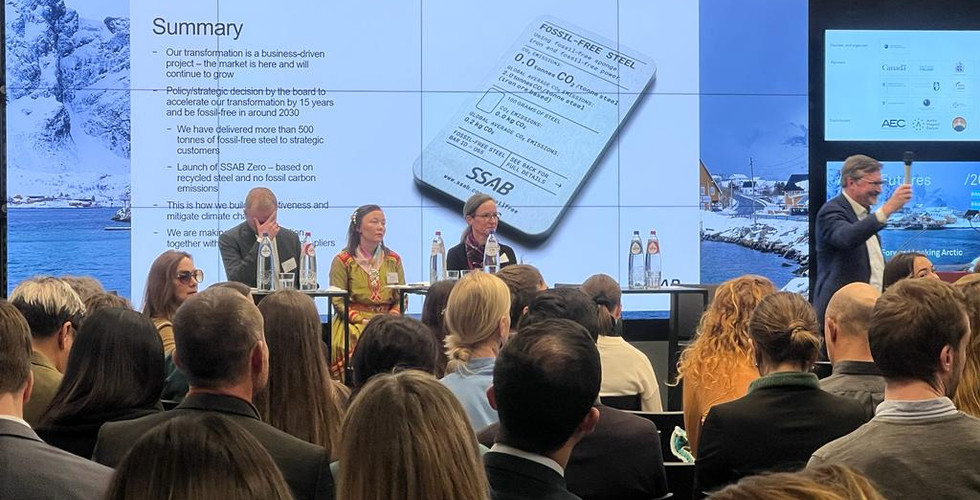On the future of the Arctic: the Arctic Futures Symposium 2023
- Marianna Pinzone

- Dec 7, 2023
- 4 min read
Last week, on Tuesday 28th and Wednesday 29th of November, the Arctic Future Symposium took place in Brussels. This event, organized by our friends and collaborators at the International Polar Foundation, has now become an institution for Arctic policy discussions at both European and international level. As every year, APECS was there to listen with great interest to all the themes discussed in the different panels.

Photo credit: Aningaaq Rosing Carlsen on Unsplash
Three keywords summarize the main discussions that occurred during the event: cooperation, sustainable development, and geopolitical challenges. With everyone agreeing that climate change is the biggest threat to the future of Arctic countries, the debates were also focusing on the possible consequences of the ongoing conflict with Russia. Closed borders, cut communication, and limited energy exchange are unfortunately all factors undermining the efforts for the sustainable development of the region, both at regional and international scales. In this matter, the Arctic Council, under the current Norwegian chairmanship, assures its intention of pursuing its essential role as manager of international collaboration for data delivery across borders.
As Morten Høglund (Norway’s Ambassador for the Arctic; chair of the Senior Officials of the Arctic Council) noted, there is nowhere else on this earth where science is such an intrinsic part of people's lives. As a member of the Association of Early Career Polar Scientists Belgium (APECS-Belgium), I couldn’t agree more! Data acquired from biological, meteorological, and societal studies represent the starting point for policy-making. For example, climate-driven environmental changes push political discussions towards the utilization of new environmental resources (e.g., hydrogen-originating steel), while the disappearance or geographical shift of key fish species is urging for alternative fishing activities. Dag Rune Olsen, Rector of the Arctic University of Tromsø (UiT), and Jan-Gunnar Winther, UiT pro-Rector for research and development, spoke on the importance of universities in attracting students from all around the world and educating them on Arctic matters. They also touched upon the limitations brought by by a cut in data availability from Russia. Permafrost was given as an example of an Arctic component necessary to study in order to understand the impact of climate change, yet mostly present on the Siberian side of the Arctic and currently impossible to assess.
Three panels focused on cooperation between Arctic and non-Arctic countries (i.e., observer states at the Arctic Council), indigenous and non-indigenous people, and local and international communities. It was stressed that while efforts are growing at international levels to sustain and protect the Arctic, local communities are struggling, facing a very important threat: the decrease in population and birth rates. Bodø, which will be the 2024 Capital of Culture, was used as an example of a city where unemployment and limited healthcare are pushing young people to leave. A city, therefore, that plans to build on local culture and expertise to strengthen the development of local commerce.
Photo credit: Marianna Pinzone.
The way is still long and complicated regarding the relationship between Arctic governance and indigenous people. Everyone agrees that governments need indigenous communities (e.g.., Norway’s development of wind-based energy, and the Sami, to whom the landscapes belong); however, it permeates from the panelists that such communities could (and should) be more included in policy-making discussions.
Up to the afternoon of the 29th, I was a little bit sad and surprised that no panel (or panelist) had pointed to the subject of education. However just as I was thinking this, an amazing group of young panellists took the stage to discuss Arctic youth challenges and opportunities. Young people see no borders and speak from the heart. The high levels of Arctic Governance underline the importance of Youth for "shaping the future of the Arctic," but it is very clear that Arctic youngsters are facing a lot of problems: one out of five Greenlandic students faces bullying when studying in Denmark, while the rate of suicide is incredibly high among young Greenlandic and Canadian indigenous people due to a combination of past eradication from their culture and an absence of job opportunities. I loved the words of the youngest member of this panel (only 15 years old and chair of the Bodø Youth Council) who ended the session saying, "You big and older people from up above, come down a little bit and speak with young people!" because they are the strength and future of the Arctic.
I was amazed at how different my perception of the Arctic was compared to native people. It doesn't matter with whom you talk here in Belgium or across Europe; they will always tell you how things in Arctic and Nordic countries are like paradise on Earth. Everyone dreams of that amazing nature and talks about the perfect education systems and job opportunities. However, when you listen to native people, you find that their perception is totally opposite. Yes, in the Arctic, there is a lot of potential for research and innovation, as well as incredible natural resources, but the harsh weather, strong climate changes, and a complex network of different cultural heritages make the development of the Arctic an extremely difficult (and interesting!) challenge.
I am a scientist, not a policy maker nor an Arctic native person. I think that a lot of the discussions that have been made in these two days are far beyond my comprehension (although extremely inspiring), however one thing is very clear to me: before referring to ourselves (perhaps a bit arrogantly) as “Arctic experts” because – at least in my case – we read tons of articles, we should remember that the Arctic is not an empty place; "the Arctic is the HOME of the Arctic people”.
Written by Marianna Pinzone
FNRS Postdoctoral Fellow in Arctic marine ecotoxicology at the University of Liege
and APECS Belgium Mentor










Comments